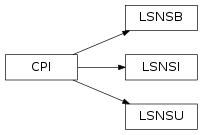5.9. pyopus.problems.karmitsa — Large scale nonsmooth test functions (Karmitsa set)¶

Large scale nonsmooth test functions (Karmitsa set) (PyOPUS subsystem name: KARMITSA)
This module is independent of PyOPUS, meaning that it can be taken as is
and used as a module in some other package. It depends only on the cpi
and the _karmitsa modules.
| [karmitsa] | Karmitsa N.: Test Problems for Large-Scale Nonsmooth Minimization, Technical report B.4/2007, University of Jyvaskyla, Jyvaskyla, 2007. |
-
class
pyopus.problems.karmitsa.LSNSU(name=None, number=None, n=2)¶ Unconstrained problems from the Karmitsa test suite. Problems 10 and 11 were added by Á. Bűrmen.
- name - problem name
- number - problem number (0-11)
- n - problem dimension
Attributes:
name- problem namen- number of variablesinitial- initial values of variablesfmin- best known minimum
This module is independent of PyOPUS, meaning that it can be taken as is and used as a module in some other package. It depends only on the cpi and the _karmitsa modules.
-
cpi()¶ Returns the common problem interface.
Subgradient is not supported.
xmin is also not available.
See the
CPIclass for more information.
-
f(x)¶ Returns the value of the function at x.
-
names= ['GeneralizedMAXQ', 'GeneralizedMXHILB', 'ChainedLQ', 'ChainedCB3I', 'ChainedCB3II', 'ActiveFaces', 'GeneralizedBrown2', 'ChainedMifflin2', 'ChainedCrescentI', 'ChainedCrescentII', 'GeneralizedL1HILB', 'GeneralizedWatson']¶ List of all function names
-
class
pyopus.problems.karmitsa.LSNSB(name=None, number=None, n=2, feasible=1)¶ Bound constrained problems from the Karmitsa test suite.
- name - problem name
- number - problem number (0-9)
- n - problem dimension
- feasible - 0=initial point unchanged, 1=feasible, 2=strictly feasible, default=1
Attributes:
name- problem namen- number of variablesxl- lower bounds on variablesxh- upper bounds on variablesinitial- initial values of variablesfmin- best known minimum
This module is independent of PyOPUS, meaning that it can be taken as is and used as a module in some other package. It depends only on the cpi and the _karmitsa modules.
-
cpi()¶ Returns the common problem interface.
Subgradient is not supported.
xmin is also not available.
See the
CPIclass for more information.
-
f(x)¶ Returns the value of the function at x.
-
names= ['GeneralizedMAXQ', 'GeneralizedMXHILB', 'ChainedLQ', 'ChainedCB3I', 'ChainedCB3II', 'ActiveFaces', 'GeneralizedBrown2', 'ChainedMifflin2', 'ChainedCrescentI', 'ChainedCrescentII']¶ List of all function names
-
class
pyopus.problems.karmitsa.LSNSI(name=None, number=None, cname=None, cnumber=None, n=10)¶ Inequality constrained problems from the Karmitsa test suite.
- name - function name
- number - function number (0-9)
- cname - constraint name
- cnumber - constraint number (0-7)
- n - problem dimension
Attributes:
name- problem namefname- function namecname- constraint namen- number of variablesm- number of constraintscl- lower bounds on constraint functionsch- upper bounds on constraint functionsinitial- initial values of variables
This module is independent of PyOPUS, meaning that it can be taken as is and used as a module in some other package. It depends only on the cpi and the _karmitsa modules.
-
c(x)¶ Returns the value of the constraints at x.
-
cnames= ['TridiagonalI', 'TridiagonalII', 'MAD1I', 'MAD1II', 'ModifiedMAD1I', 'ModifiedMAD1II', 'P20I', 'P20II']¶ List of all constraint names
-
cpi()¶ Returns the common problem interface.
Subgradient is not supported.
xmin is also not available.
See the
CPIclass for more information.
-
f(x)¶ Returns the value of the function at x.
-
names= ['GeneralizedMAXQ', 'GeneralizedMXHILB', 'ChainedLQ', 'ChainedCB3I', 'ChainedCB3II', 'ActiveFaces', 'GeneralizedBrown2', 'ChainedMifflin2', 'ChainedCrescentI', 'ChainedCrescentII']¶ List of all function names
Example file karmitsa.py in folder demo/problems/
# Karmitsa test suite
from pyopus.problems.karmitsa import *
if __name__=='__main__':
print("Unconstrained, n=50")
for ii in range(10):
prob=LSNSU(number=ii, n=50)
print("%d: %25s: f0=%e" % (ii, prob.name, prob.f(prob.initial)))
print()
print("Bound constrained, n=50")
for ii in range(10):
prob=LSNSB(number=ii, n=50)
print("%d: %25s: f0=%e" % (ii, prob.name, prob.f(prob.initial)))
print()
print("Inequality constrained, n=10")
for ii in range(10):
for jj in range(8):
prob=LSNSI(number=ii, cnumber=jj, n=10)
c=prob.c(prob.initial)
feas=((c>prob.cl) & (c<prob.ch)).all()
print("%d, %d: %30s: f0=%12.4e feas=%d" % (ii,jj, prob.name, prob.f(prob.initial), feas))
print()